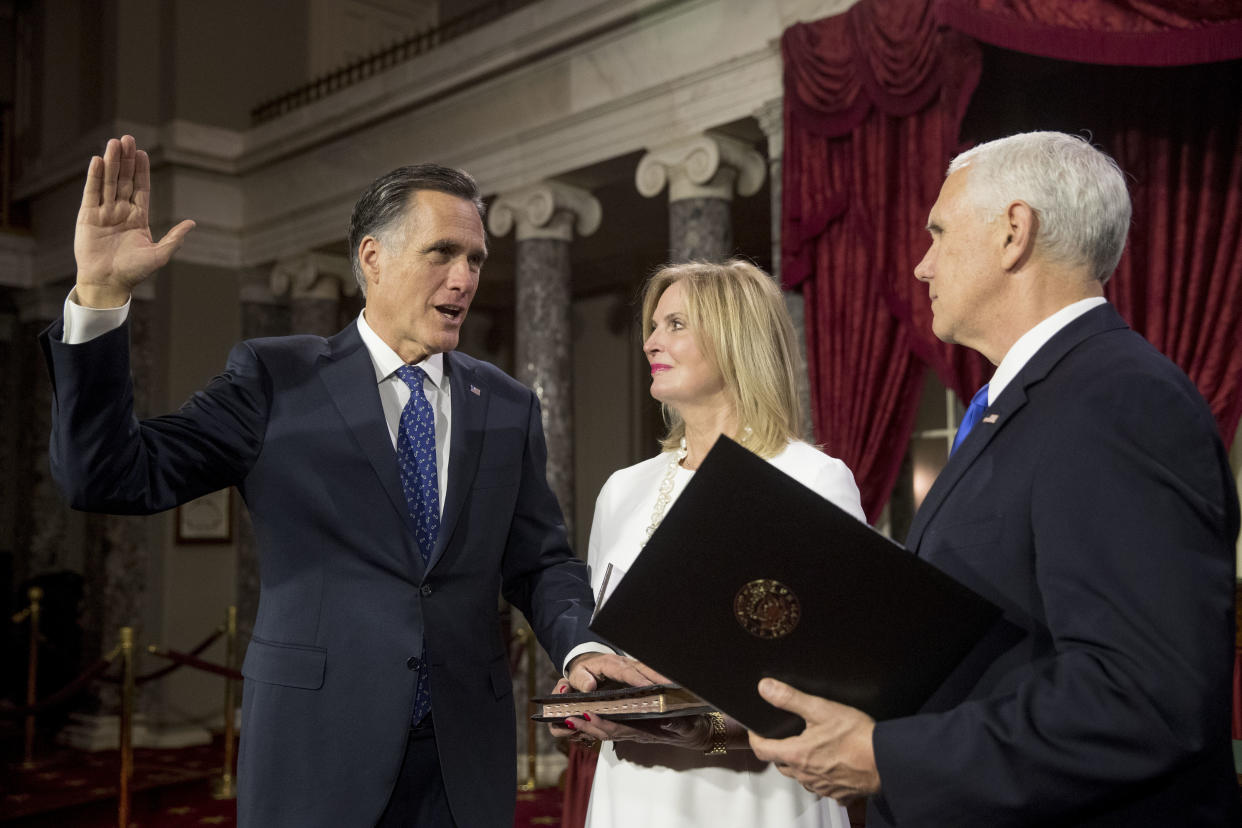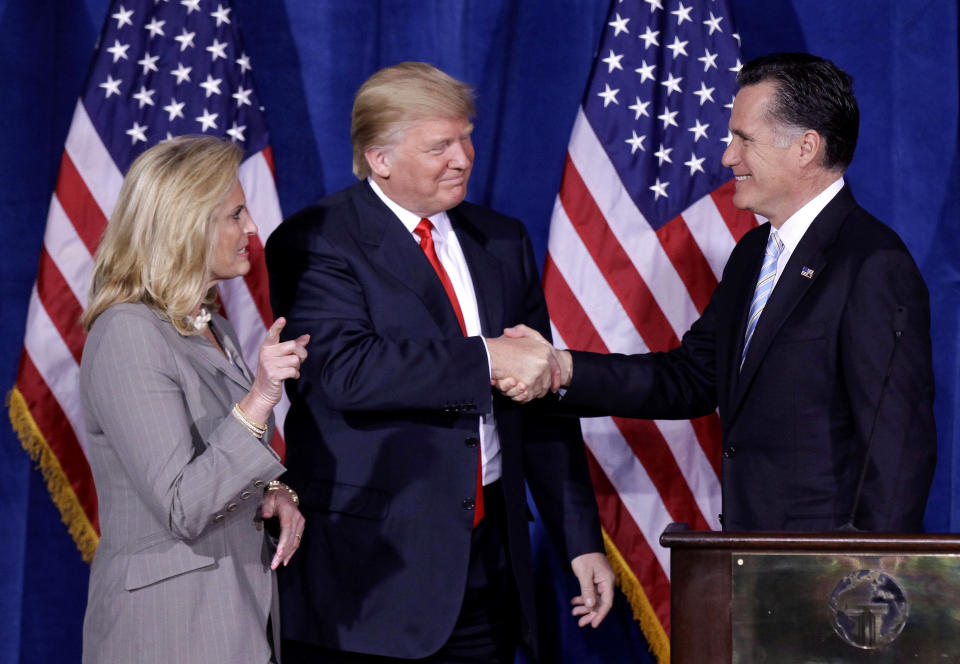Opinion: Mitt Romney Will Always Say Whatever He Thinks 51 Percent Of Voters Want To Hear

There he goes again. As Mitt Romney prepared to enter his new life as a Republican senator from Utah, he wanted to make sure Americans knew he hadn’t abandoned his old habit of flip-flopping.
In an op-ed for The Washington Post earlier this week, Romney accused President Donald Trump of not having “risen to the mantle of the office,” of showing a “shortfall” in character and leadership, and of “words and actions” that “have caused dismay around the world.”
Predictably, Romney’s statement of the obvious about the atrocity of the Trump presidency has been hailed for its supposed courage and principle. CNN called Romney’s words “scathing.” On Twitter, Vox’s Ezra Klein pronounced Romney’s op-ed “meaningful” and “a real risk.” And MSNBC promptly hailed Romney and Sen. Ben Sasse (R-Neb.) as the Senate’s “new generation of mavericks.”
All of it was overblown for an op-ed that still managed to endorse most of the president’s policies and praised Trump’s selection of wingnuts like former Attorney General Jeff Sessions to his administration. But the media response shouldn’t be all that surprising given its desperation to celebrate any tiny hint of anti-Trump resistance in the Republican ranks.
Fortunately, a few cooler heads offered tempered responses. Writing in the New Republic, Matt Ford provided the clearest articulation of what seemed to be the consensus critique of Romney’s essay: that Romney’s objection to Trump’s style rather than his substance represents nothing different from the feckless protestations once offered by former Senators Jeff Flake (R-Ariz.) and Bob Corker (R-Tenn.).
Still, such pushbacks miss a far more important point. Much like everything else he has done in his public career, Romney’s condemnation of Trump isn’t an act of principled conviction but rather of personal convenience ― one calculated for his own advancement rather than the common good. While Flake and Corker’s objections to Trump were largely about achieving partisan and ideological goals ― Trump was making Republicans look bad! ― Romney is merely keeping with the self-serving flexibility that has always marked his political life.

Just a quick review of Romney’s relationship with Trump makes that all too obvious.
In his essay, Romney made sure to point out that Trump “was not [his] choice” for the Republican nomination. But he failed, of course, to mention how he was all too happy to accept Trump’s endorsements during his own presidential run in 2012 and in his race for the Senate last year.
In between those two endorsements, Romney blasted Trump as “a phony, a fraud” just months before the 2016 election. Yet just as soon as Trump won the presidency, Romney opportunistically changed his tune, prostrating himself before the president-elect in a desperate attempt to be named his new secretary of state and then publicly thanking Trump for backing his Senate ambitions.
Long before Trump entered politics, Romney had clearly established his propensity for flip-flopping. In his first run for public office against then-Sen. Ted Kennedy (D) in 1994 and later in his successful 2002 race for governor of Massachusetts, Romney declared himself a strong supporter of abortion rights – a requisite position for any Republican hoping to win office in New England. In both races, Romney cozied up to Planned Parenthood to demonstrate his pro-choice commitments.
In 2012, facing a much different electorate, Romney promptly abandoned that stance and called for defunding Planned Parenthood to win the evangelical-heavy Republican presidential primaries. “He can’t be trusted,” an ad supporting Romney’s rival Newt Gingrich argued that year.
Romney proved most willing to shapeshift in order to secure his political fortune when he turned on the most significant achievement of his political career: Romneycare. During the 2012 race, Romney called for the repeal of Obamacare, the federal health care program that had largely replicated what Romney had put into place as Massachusetts governor. That flip-flop also disavowed his support for a national health care plan during his first presidential run only four years before. “What you have to do is what we did in Massachusetts,” Romney had said then.
By 2012, Romney realized that message wouldn’t work with Republican voters. In the year’s presidential primaries, Romney touted his record as a “severely conservative” governor, a description so laughable and inelegant it elicited hearty mocking from conservative pundits who loathed Romney’s opportunism.
Once he had won the nomination, Romney immediately tacked to the center, boasting of his moderate credentials and pledging to be a bipartisan leader as president. Political commentators noted that most candidates sought to convey to voters a set of core beliefs in their bids for public office. “Those things don’t seem to matter to Mitt Romney,” the New York Times editorialized at the time.
They have never mattered to Romney as much as his presidential aspirations have. Indeed, those stubborn ambitions are so well known that just a day after his Washington Post op-ed ran, Romney sought to clarify he has no plans to primary Trump in 2020.
That’s doubtful. Romney’s win-at-any-cost approach has marked his entire career, and it is surely the fire behind his attacks on Trump.
But that’s also not to say he shouldn’t do it. Romney may only be driven by self-interest. But if he does primary Donald Trump, all Americans will have a self-interest in that too.
Neil J. Young is a historian and the author of We Gather Together: The Religious Right and the Problem of Interfaith Politics. He hosts the history podcast “Past Present.”
ALSO ON HUFFPOST OPINION
Mike Pompeo Is The Spineless Personification Of Donald Trump's Nihilist Foreign Policy
Women Of Color Are Here To Make Congress Great Again
Pay-Go Rule Shows Democrats Are Still Playing The GOP's Game
Love HuffPost? Become a founding member of HuffPost Plus today.
This article originally appeared on HuffPost.

